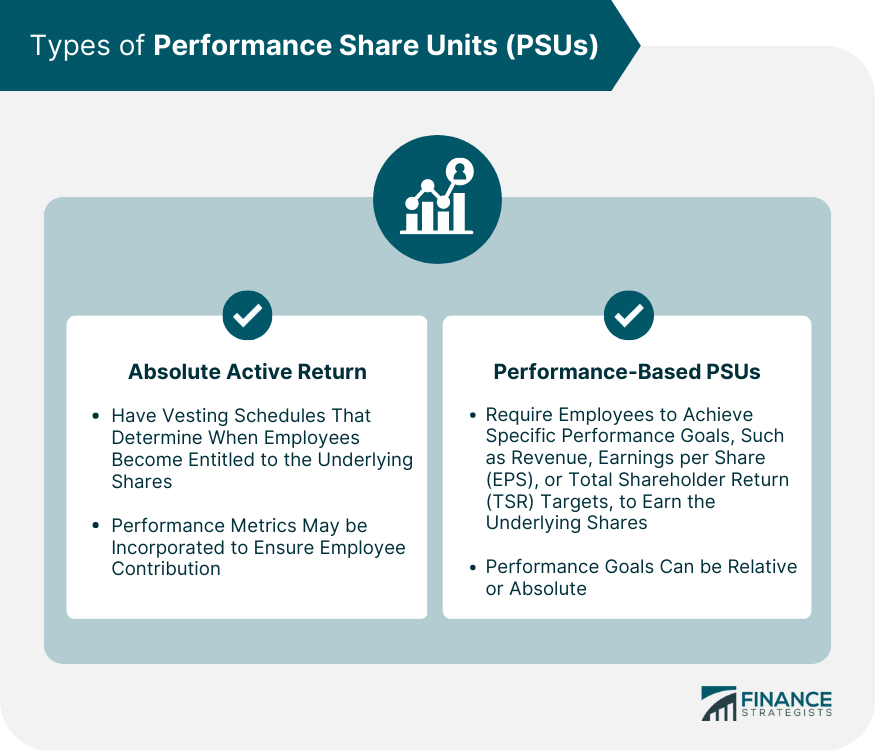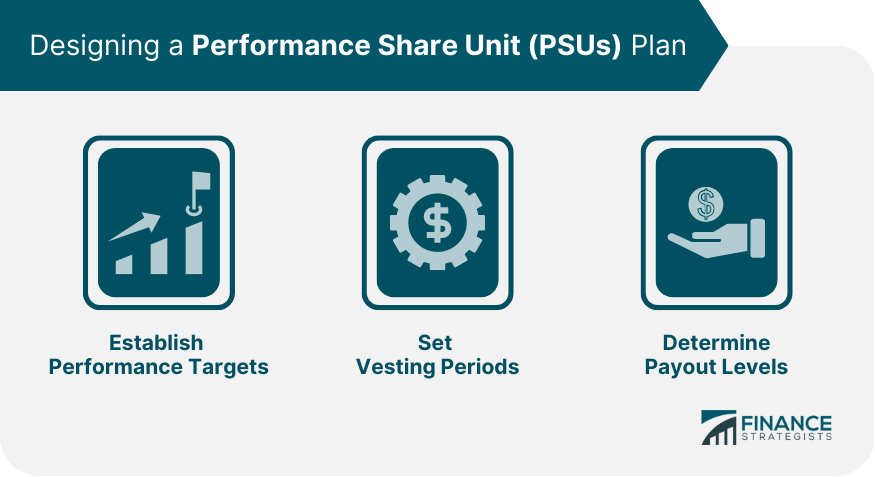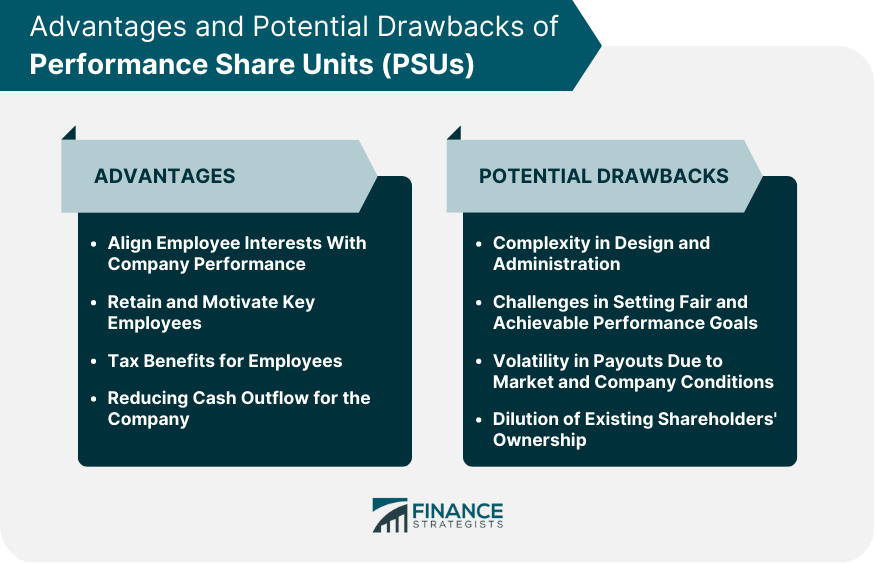Performance Share Units are a type of equity-based compensation granted to employees, typically executives and senior managers, that are earned and converted into company shares. It is based on the achievement of specific performance goals over a predetermined period. PSUs align employees' interests with company performance, incentivize the achievement of strategic objectives, and aid in retaining and motivating key talent. Time-based PSUs have vesting schedules that determine when employees become entitled to the underlying shares, often based on tenure or the passage of a specified period. Even though time-based PSUs primarily rely on vesting schedules, they may still incorporate performance metrics to ensure employees contribute to the company's success during the vesting period. Performance-based PSUs require employees to achieve specific performance goals, such as revenue, earnings per share (EPS), or total shareholder return (TSR) targets, to earn the underlying shares. Performance goals for PSUs can be based on relative performance, comparing the company's results to those of industry peers or an index, or absolute performance, which focuses solely on the company's own performance. Financial targets for PSU plans can include revenue, net income, or return on investment (ROI) metrics, incentivizing employees to focus on the company's financial success. To promote overall company performance, operational targets for PSU plans may encompass non-financial goals, such as customer satisfaction, product development milestones, or employee engagement. Cliff vesting occurs when all PSUs vest at once after a specified period, encouraging employees to remain with the company and contribute to its success over the entire vesting term. Graded vesting involves PSUs vesting incrementally over time, providing employees with a gradually increasing stake in the company's performance and fostering long-term commitment. The threshold represents the minimum level of performance required for employees to earn any PSUs, ensuring that rewards are only granted for meaningful achievements. The target is the performance level at which employees earn a predetermined number of PSUs, typically designed to be achievable but requiring significant effort and focus. The maximum payout level represents the upper limit of PSUs that can be earned, capping the potential reward and encouraging employees to strive for exceptional performance. PSUs are subject to financial reporting requirements, including recognizing compensation expenses and disclosing outstanding awards in financial statements, ensuring transparency and compliance with accounting standards. Both companies and employees face tax implications when granting, vesting, and selling PSUs, necessitating careful planning and consideration to optimize tax outcomes and comply with relevant regulations. PSUs must be structured and administered in accordance with applicable securities, employment, and corporate governance laws, requiring companies to navigate a complex legal and regulatory landscape. PSUs align employees' interests with those of shareholders by linking their compensation directly to the company's success, incentivizing them to work towards strategic objectives. By offering PSUs as part of compensation packages, companies can better retain and motivate key employees, fostering a high-performance culture and promoting long-term value creation. PSUs can provide tax advantages for employees, as they are typically taxed at the time of vesting rather than at grant, potentially allowing for capital gains treatment on the appreciation of the underlying shares. By granting PSUs instead of cash bonuses, companies can reduce their cash outflow, preserving resources for reinvestment in growth initiatives and other strategic priorities. PSUs can be complex to design and administer, requiring careful consideration of performance metrics, vesting schedules, payout levels, and ongoing monitoring and adjustments. Determining fair and achievable performance goals for PSU plans can be challenging, as they must strike a balance between motivating employees and ensuring that rewards are commensurate with the value created. PSU payouts can be volatile, as they are tied to market and company performance, which can result in wide fluctuations in the value of the underlying shares and potentially create uncertainty for employees. The issuance of PSUs can dilute existing shareholders' ownership as new shares are created and allocated to employees upon vesting, potentially impacting the value of outstanding shares. Companies should regularly review and update PSU performance goals to ensure they remain relevant and aligned with the organization's strategic objectives and market conditions. Clear communication with employees is crucial when implementing a PSU plan, as it helps to create understanding and buy-in, fostering a sense of ownership and motivation. PSU plans should balance short-term and long-term performance metrics to encourage employees to focus on both immediate and future results, supporting sustainable value creation. Companies can consider combining PSUs with other forms of equity compensation, such as stock options or restricted stock units (RSUs), to create a diversified and balanced incentive structure for employees. PSUs play an increasingly important role in modern employee compensation strategies, as they help to align employee interests with company performance and incentivize the achievement of strategic objectives. Companies considering implementing a PSU plan should carefully weigh the potential benefits and drawbacks and consider regulatory and accounting requirements to design an effective and compliant program. As the business landscape continues to evolve, future trends in equity compensation, including the adoption and refinement of PSUs, will likely shape the way organizations attract, retain, and motivate talent. Organizations considering implementing a PSU plan should seek the guidance of a financial advisor to ensure the plan is designed and administered effectively, considering the company's strategic objectives, industry best practices, and regulatory requirements. What Are Performance Share Units (PSUs)?
Types of PSUs
Time-Based PSUs
Vesting Schedules
Performance Metrics
Performance-Based PSUs
Performance Goals
Relative and Absolute Performance

Designing a PSU Plan
Establish Performance Targets
Financial Targets
Operational Targets
Set Vesting Periods
Cliff Vesting
Graded Vesting
Determine Payout Levels
Threshold
Target
Maximum

Regulatory and Accounting Considerations for PSUs
Financial Reporting Requirements
Tax Implications for Companies and Employees
Legal and Compliance Considerations
Advantages of PSUs
Aligning Employee Interests with Company Performance
Retaining and Motivating Key Employees
Tax Benefits for Employees
Reducing Cash Outflow for the Company
Potential Drawbacks of PSUs
Complexity in Design and Administration
Challenges in Setting Fair and Achievable Performance Goals
Volatility in Payouts Due to Market and Company Conditions
Dilution of Existing Shareholders' Ownership

Best Practices for Implementing PSUs
Regular Review and Updating of Performance Goals
Ensuring Clear Communication with Employees
Balancing Short-Term and Long-Term Performance Metrics
Combining PSUs with Other Forms of Equity Compensation
Final Thoughts
Performance Share Units (PSUs) FAQs
Performance Share Units (PSUs) are a type of equity-based compensation granted to employees, usually, executives and senior managers, based on the achievement of specific performance goals over a predetermined period. They are used to align employees' interests with company performance, incentivize the achievement of strategic objectives, and retain and motivate key talent.
Time-based PSUs have vesting schedules based on tenure or the passage of a specified period, while performance-based PSUs require the achievement of specific performance goals, such as revenue or earnings per share targets, to earn the underlying shares. Time-based PSUs may still incorporate performance metrics, but performance-based PSUs are more directly tied to company performance.
Potential drawbacks of PSUs include complexity in design and administration, challenges in setting fair and achievable performance goals, volatility in payouts due to market and company conditions, and dilution of existing shareholders' ownership.
Best practices for implementing PSUs include regularly reviewing and updating performance goals, ensuring clear communication with employees, balancing short-term and long-term performance metrics, and combining PSUs with other forms of equity compensation to create a diversified incentive structure.
Companies using PSUs must adhere to financial reporting requirements, such as recognizing compensation expenses and disclosing outstanding awards in financial statements. They should also consider the tax implications for both the company and employees, as well as comply with applicable securities, employment, and corporate governance laws.
True Tamplin is a published author, public speaker, CEO of UpDigital, and founder of Finance Strategists.
True is a Certified Educator in Personal Finance (CEPF®), author of The Handy Financial Ratios Guide, a member of the Society for Advancing Business Editing and Writing, contributes to his financial education site, Finance Strategists, and has spoken to various financial communities such as the CFA Institute, as well as university students like his Alma mater, Biola University, where he received a bachelor of science in business and data analytics.
To learn more about True, visit his personal website or view his author profiles on Amazon, Nasdaq and Forbes.















